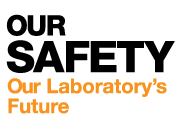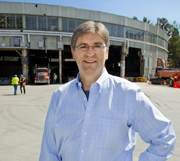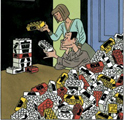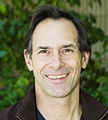



Bob Cronin, a project manager in the Facilities Division, is in charge of tearing down the Bevatron, one of the world's greatest particle accelerators, including the approximately 123,000-gross-square-foot steel-frame building that housed it. But before even the first workers or cranes were allowed on the site to hoist concrete shielding blocks weighing as much as 30 tons, years of planning took place to protect the environment as well as the health and safety of demolition workers and Lab employees alike. More>
Berkeley Lab has been notified that the University Professional and Technical Employees (UPTE) union has served notice to the University of California that it intends to strike on Thursday, Sept. 24, at all UC locations, including Berkeley Lab, for a period of 24 hours beginning at 12 a.m. and concluding at 11:59 p.m. UPTE represents 385 Berkeley Lab employees, including Research, Electronic, Safety/Health, Telecommunication, and Graphic Arts Technicians, as well as Accelerator Operators, Research Associates, and Photographic Specialists. Those who have UPTE employees working in their division should make contingency plans, should those staff choose not to work on Sept. 24. It is not known how many UPTE staff plan to participate in the strike, or if other unions will honor the picket lines. Go here for important information on gate access during the proposed strike. For more information, contact your HR Center.
 Stimulus Funding: Materials Sciences Division Receives $25,000 for Solar Cell Work
Stimulus Funding: Materials Sciences Division Receives $25,000 for Solar Cell Work Kin Man Yu of the Lab's Solar Energy Materials Research Group (Materials Sciences Division) is receiving $24,969 to conduct testing on solar cell coupon samples prepared by Acree Technologies. Acree Technologies is developing new transparent, conducting oxide materials for solar cell applications. The results from Berkeley Lab will be used by Acree to optimize thin film deposition process for improved solar cell performance. This Recovery Act funding comes to Berkeley Lab as a subaward from Acree Technologies based in Concord, CA. More>
 In The News: A Life of Its Own — Where Will Synthetic Biology Lead Us?
In The News: A Life of Its Own — Where Will Synthetic Biology Lead Us? [The New Yorker] The first time Jay Keasling remembers hearing the word "artemisinin," about a decade ago, he had no idea what it meant. "Not a clue," Keasling, a researcher at Berkeley Lab, recalled. Although artemisinin has become the world's most important malaria medicine, Keasling wasn't an expert on infectious diseases. But he happened to be in the process of creating a new discipline, synthetic biology, which — by combining elements of engineering, chemistry, computer science, and molecular biology — seeks to assemble the biological tools necessary to redesign the living world. More>
 [SciDAC Review] From green computers to the death of Moore's Law, researchers from Berkeley Lab's Computing Sciences Division write about the evolving trends of scientific high performance computing in the Fall 2009 issue of the Department of Energy's Scientific Discovery Through Advanced Computing (SciDAC) Review. Articles include Electronic Structure: Divide and Conquer for Tractable Computations, by Lin-Wang Wang and John Hules; The Manycore Revolution: Will HPC Lead or Follow?, by John Shalf, Jon Bashor, Dave Patterson, Krste Asanovic, Katherine Yelick, Kurt Keutzer of UC Berkeley and Tim Mattson of Intel; Green Flash Project: The Challenge of Energy-Efficient HPC, by John Shalf, Michael Wehner, Leonid Oliker, and John Hules; and FastBit: A Lightning-Fast Index Drives Massive Data Analysis, by Kesheng John Wu, Arie Shoshani, and Ekow Otoo.
[SciDAC Review] From green computers to the death of Moore's Law, researchers from Berkeley Lab's Computing Sciences Division write about the evolving trends of scientific high performance computing in the Fall 2009 issue of the Department of Energy's Scientific Discovery Through Advanced Computing (SciDAC) Review. Articles include Electronic Structure: Divide and Conquer for Tractable Computations, by Lin-Wang Wang and John Hules; The Manycore Revolution: Will HPC Lead or Follow?, by John Shalf, Jon Bashor, Dave Patterson, Krste Asanovic, Katherine Yelick, Kurt Keutzer of UC Berkeley and Tim Mattson of Intel; Green Flash Project: The Challenge of Energy-Efficient HPC, by John Shalf, Michael Wehner, Leonid Oliker, and John Hules; and FastBit: A Lightning-Fast Index Drives Massive Data Analysis, by Kesheng John Wu, Arie Shoshani, and Ekow Otoo.
 The fall series of Science at the Theater events kicks off Monday, Sept. 28, with a panel on biofuels moderated by John Fowler, health and science editor of KTVU Channel 2. The three panelists are Jay Keasling, acting deputy director of the Lab and head of the Joint BioEnergy Institute, Jim Bristow (pictured), deputy director of programs at the Joint Genome Institute and Susannah Green Tringe, a computational biologist at JGI. The event takes place at 7 p.m. in the Berkeley Repertory Theatre (2015 Addison St.) and is free and open to the public. More>
The fall series of Science at the Theater events kicks off Monday, Sept. 28, with a panel on biofuels moderated by John Fowler, health and science editor of KTVU Channel 2. The three panelists are Jay Keasling, acting deputy director of the Lab and head of the Joint BioEnergy Institute, Jim Bristow (pictured), deputy director of programs at the Joint Genome Institute and Susannah Green Tringe, a computational biologist at JGI. The event takes place at 7 p.m. in the Berkeley Repertory Theatre (2015 Addison St.) and is free and open to the public. More>
 Facilities: Construction Service Group Moves Cabling Machine
Facilities: Construction Service Group Moves Cabling MachineThe Facilities Construction Services Group has relocated a 44,000-pound, 110-inch gap lathe to Building 77A. The nearly 50-year-old lathe is operated by the Lab's Superconducting Magnet program to produce cable for high-field superconducting magnets.
The Peet's Coffee Bar in the cafeteria will be closed this week as new counters and counter tops are installed. Regular brewed coffee will be available in the main food area, but no custom machine-made coffee items will be available.
Today at Berkeley Lab is produced by Public Affairs' Communications Group